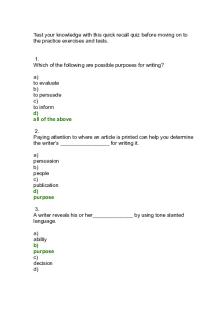Sonnet 130 Analysis: Theme and Tone PDF

| Title | Sonnet 130 Analysis: Theme and Tone |
|---|---|
| Author | Melissa Walls |
| Course | English I |
| Institution | Islip High School |
| Pages | 4 |
| File Size | 214.2 KB |
| File Type | |
| Total Downloads | 37 |
| Total Views | 158 |
Summary
Use the document to help students understand Shakespeare's use of tone....
Description
AnalyzingPoems IambicPentameter robablythes inglem ostu sefultechnicalterminp oetry(andind rama,too).S hmoopers,ify ou Definition:Hereitis,folks.P learnoneterminpoetry,letitbetheoldI.P.Ormaybem etaphor.Butyoualreadyknewthatone. Let'sbreakitdown: etricalfootthatconsistsofanunstressedsyllablefollowedbyastressedone—daDUM. ● Aniambisam ● Pentameansfive. ● Meterreferstoaregularrhythmicpatterninpoetry. Soiambicpentameterisakindofrhythmicpatternthatconsistsoffiveiambsperline,almostlikefiveheartbeats:daDUM daDUMdaDUMdaDUMdaDUM. Let'stryitoutonthefirstlineofS hakespeare'sT welfthN ight: Ifm usicb ethefoodoflove,playo n. Justreadthatlinealoudtoyourself,andyou'llbesuretohearthosedaDUMs. Ofcourse,thoughmanypoetsusethisrhythm,itmightgetprettystinkin'boringafterawhileiftheydidn'tshakeitupabit.So whileatonofpoemsarewritteniniambicpentameter,y ou'db eh ardp ressedtofindo nethatfollowsthem eterp erfectly. Poetsliketomixitupwithmetricalvariationslikeextrasyllablesoroutoforderstresses.Besuretocheckoutourpageon meterform ore. Iambicpentameterhassomemajorlyearlyroots,datingbacktoLatinverseandOldFrench,butC haucerisconsideredthe ales.Y ep,it'sb eena roundthatlong. pioneeroftheverseinEnglishanduseditforhisfamousC anterburyT Sonnet130ispartofagroupofpoemsbyW illiamS hakespearethatscholarsthinkwasaddressedtosomeonetheycall"The DarkLady."Wegetlittleglimpsesofh erinthispoem.Shakespearetalksaboutherhair,thec oloro fh ers kin,e tc.M ostly, though,thispoemisagentleparodyoftraditionallovepoetry.Shakespeareusesthissonnettopokefunatthekindsof exaggeratedcomparisonssomepoetsofhisdaymadewhentalkingabouttheirlovers.Hemakesfunofclichédimagesthat werewornouteventhen,like"eyeslikethesun,"and"skinaswhiteassnow."T hesek indso fo verthetopc ompliments appeareverywhereinpoemsbywriterslikeP etrarch,whowrotefamousItaliansonnetsinthe14thcentury.Althoughnoone issurewhetherthewomanShakespeareistalkingaboutreallyexisted,readerscanseehowwellheusesthissonnetto skewerlamepoeticclichés.
WHYS HOULDIC ARE? So,whenwesaythewords"lovepoem,"whatpopsintoyourhead?Maybeyou'vealwaysthoughtthatalovepoemhadto besappy,likesomethingyou'dfindinaValentine'sDaycard.Ifwetoldyouthatthelovepoemwehadinmindwasover400 yearsold,thatmightmakeitevenworse,right?Oldlovepoemsbringtomindflowerylanguageandthekindofunrealistic glopthatyoucouldneverbringyourselftosaywithastraightface. But,ifyouthinksappylovepoemsareridiculous,you'renotalone–that'sprettymuchhowS hakespearefelttoo,andhe spendsthesefourteenlinesrippingthatkindofpoemapart.Shakespeare'sSonnet130isaparodyofthekindofinsincere, sicklysweetlovepoemsthatauthorshavebeenwriting(andalotofpeoplehavebeenhating)forcenturies.Now,d on'tg et uswrong,we'renotantilovepoetryandwecangetintothesappystuffs ometimestoo.B utw e'ren otfanso flamec lichés, andwethinkit'sprettyfuntowatchShakespearegototownontheminthissonnet.X Sonnet130islikealovepoemturnedonitshead.Usually,ifyouweretalkingaboutyourbeloved,youwouldgooutofyour oemc omparing waytopraiseher,top ointa llthew aysthats heistheb est.Inthisc ase,though,Shakespearespendsthisp hismistress'sappearancetootherthings,andthentellingushowshedoesn'tmeasureuptothem.Hegoesthroughawhole laundrylist,givingusdetailsabouttheflawsofherbody,hersmell,eventhesoundofhervoice.Then,attheend,he changeshistuneandtellsusabouthisrealandcompleteloveforher.
SONNET130 Mymistress'eyesarenothinglikethesun; Coralisfarmoreredthanherlips'red; Ifsnowbewhite,whythenherbreastsaredun; Ifhairsbewires,blackwiresgrowonherhead. Ihaveseenrosesdamasked,redandwhite, ButnosuchrosesseeIinhercheeks; Andinsomeperfumesistheremoredelight Thaninthebreaththatfrommymistressreeks. Ilovetohearherspeak,yetwellIknow Thatmusichathafarmorepleasingsound; IgrantIneversawagoddessgo; Mymistresswhenshewalkstreadsontheground. Andyet,byheaven,Ithinkmyloveasrare Asanyshebeliedwithfalsecompare. Getoutthemicroscope,becausewe’regoingthroughthispoemlinebyline.X Line1 Mymistress'eyesarenothinglikethesun; ● ● ● ● ●
Hereweareintroducedforthefirsttimetothemaincharacterinthispoem,thespeaker's"mistress." Today,whenweusetheword"mistress,"it'susuallytorefertoawomanwhoisdatingamarriedman.InShakespeare,though,itwasmore general,like"mylove"or"mydarling." Thespeakerjumpsrightintohisantilovepoem,lettingusknowthatthislady'seyesaren'tlikethesun.Well,sowhat?Wewouldn'treallyexpect themtobe,wouldwe? Aswereadthenextfewlinesthough,weseethatthecomparisonisastandardwayofpraisingabeautifulwomaninapoem.It'slikesaying,"her eyesarelikesapphires." Ourspeakerisrefusingtofallbackonclichésthough,insteadtellingusthatthissimiledoesn'tapplyatall.
Line2 Coralisfarmoreredthanherlips'red; ● ● ●
Ifyouimaginedastereotypicallybeautifulwoman,likeamodelinamagazine,she'dprobablyhaveredlips,right? Certainkindsofveryredcoralarepolishedandusedtomakejewelrysoifyoucomparedlipstocoral,you'dbethinkingofthemostbeautiful, shinyredthingyoucouldimagine. Nope,saysthespeaker,thatdoesn'tsoundlikemygirlfriend'slipsatall.
Line3 Ifsnowbewhite,whythenherbreastsaredun; ● ● ● ● ● ●
Nextcomethemistress'sbreasts. Theygetprettymuchthesametreatmentasherlips. Ifthereddestredislikecoral,thenthewhitestwhiteisthecolorofsnow.Apoetcouldpraiseawomanforhavingskinaswhiteassnow. Nothere,though.Thiswoman'sskinisn'twhite,orevencreamcolored.Instead,thespeakercallsit"dun,"asortofgrayishbrowncolor. Besuretonoticethelittlechangeshere.Inthefirsttwolines,wehearonlythatthewomanisn'tliketheseotherthings(thesun,coral). Nowwegetanactualdescription,anadjective("dun")thatappliestoher.Unfortunately,itjustmakeshersounduglier.Dunisawordoftenusedto describethecolorofahorse,anddefinitelynotthekindofthingawomanwouldbethrilledtohearaboutherbreasts.
Line4 Ifhairsbewires,blackwiresgrowonherhead.
● ● ●
Nowthingsjustgetworse. Ifapoetwantedtobesentimentalandsweet,hemightcomparehislover'shairtosomethingsoft,smooth,andshiny,likesilk.Herethough,the mistress'shairiscomparedtoblackwiresstickingoutofthetopofherhead. Keepinmindthatthewholepointofthispoemistopushbackagainststandardwaysoftalkingaboutwomeninpoems.Soit'snotnecessarilybad thatshehasfrizzyblackhair.
Lines56 Ihaveseenrosesdamasked,redandwhite, ButnosuchrosesseeIinhercheeks; ● ● ●
There'satrickywordhere:damasked.Basicallyitjustmeansapatternofmixedcolorswovenintoexpensivefabric. Soimaginearosewithawhiteandredpatternonit,ormaybeabouquetofredandwhiteroses.Ourspeakerhasseenbeautifulroseslikethat, buthismistress'scheeksdon'tremindhimofthematall. Maybesomeperfectlybeautifulwomanhascheeksthatarewhitewithjustalittleblushofred,butthat'snotthewomanhe'stalkingabout.
Lines78 Andinsomeperfumesistheremoredelight Thaninthebreaththatfrommymistressreeks. ● ● ● ● ●
Bynowwe'vegottheidea,right? Thespeakertellsusthatsomeperfumessmellbetter(givemore"delight")thanthiswoman'slover'sbreath. Apparentlyshestinks,too. Let'srecapquickly:sofarthespeakersaidthathismistress'seyesaren'tthatgreat,thatherlipsaren'tthatred,thatherskinisyellowish,thather hairislikewires,thathercheeksarenothinglikeroses,andthatherbreathreeks. Whatawaytostartalovepoem.
Lines910 Ilovetohearherspeak,yetwellIknow Thatmusichathafarmorepleasingsound; ● ● ● ● ● ● ●
Now,afterallofthatcriticism,thespeakerstartstogetalittlebitnicer. Headmitsthathereallydoes"lovetohearherspeak."Seemslikeshewasdueforacompliment,doesn'tit? Thespeakercan'tjustletitgoatthat,though,andimmediatelyhestartstobackupalittle. Basically,that"yet"inthemiddleofline9getsusreadyforanegativecomparison.It'slikesaying,"You'rereallygreat,but…" Then,inline10,wegetthenegativehalfofthatthought:hethinksthatmusicis"morepleasing"thanthesoundofhervoice. Well,maybethat'snotsobadafterall.Ifyourboyfriendorgirlfriendsaid,"Ilikemusicmorethanthesoundofyourvoice,"youmightnotexactlybe thrilled,butitsurebeatshavinghimorhertellyouthatyourbreathstinks. Maybethespeakerissofteningupalittlebit.
Line1112 IgrantIneversawagoddessgo; Mymistresswhenshewalkstreadsontheground. ●
● ●
Here'sanotherthoughtthatissplitovertwolines.Inline11,thespeakeressentiallytellsusthathe'swillingtoadmitthathe'sneverseena goddessmove.(SeewhyShakespeare'sthepoetandnotus?Listentohowsmoothlythosewordsflowtogether:grant…goddess…go.Nice, huh?) Now,whenthespeakerfinisheshisthoughtonline12,he'snotactuallybeingmeanatall,juststatingthefacts.Hismistressisn'tagoddess,she doesn'tflyorsoarorfloatalong.Shejustwalks(treads)likeanormalperson,ontheground. Apretentiouspoetmightsay:"Mylovewalkslikeagoddess,"butwewouldknowthatitisn'ttrue.Hasheeverseenagoddess?Maybethebest waytotellsomeoneyoulovehimorherinapoemistobesimple,honestandstraightforward.
Lines1314 Andyet,byheaven,Ithinkmyloveasrare Asanyshebeliedwithfalsecompare. ● ● ●
Now,atlonglast,wegettothesweetpart,butitmighttakealittlebitoftranslating. HerearetwolinesinplainEnglish:thespeakerthinksthathisloverisaswonderful("rare")asanywoman("anyshe")whowasever misrepresented("belied")byanexaggeratedcomparison("falsecompare"). Theselasttwolinesarethepayoffforthewholepoem.Theyserveasthepunchlineforthejoke.Theydrivehomethespeaker'smainpoint,that unlikeotherpeoplewhowritesonnets,hedoesn'tneedflowerytermsorfancycomparisons.Hecanjusttellhismistress,plainlyandsimply,that helovesherforwhosheis.Awww…
ShakespeareanSonnet(FormandMeter)
Therearelotsofdifferentwaystowriteasonnet,whichisbasicallyakindofshortpoem.Shakespeare'ssonnetshaveaveryspecificform,though,and scholarshavenamedthatformthe"Shakespeareansonnet"afterthegreatbard.Thesekindsofsonnetshaveseveralthingsincommon: 1. 2. 3.
4.
Theyare14lineslong. Theyarewritteniniambicpentameter. Usually,theyincludeafeaturecalleda"turn."Thisisamomentinthepoemwherethethemeorthetonechangesinasurprisingway.This particularsonnetgivesareallyniceexampleoftheturn.Itcomesinthelasttwolines,wherethespeakerswitcheshisstrategycompletely.Hehas beencriticizinghismistress,andthen,allofasudden,hestartstellingushowmuchhelovesher. Thefirsttwelvelinesrhymeinalternatingpairs.Toshowhowthisworks,wecanassignalettertoeachrhyme:We'llshowyouhowitworks: a. Mymistress'eyesarenothinglikethesun;A b. Coralisfarmoreredthanherlips'red;B c. Ifsnowbewhite,whythenherbreastsaredun;A d. Ifhairsbewires,blackwiresgrowonherhead.B
So,forthewholepoem,therhymeschemewouldbeABABCDCDEFEFGG. 5.
Seethoselasttwolettersattheend?ThisisthelastimportantthingtoknowabouttheformofaShakespeareansonnet:thepoemalwaysends withtworhyminglines,onerightaftertheother.Wecallthisacouplet.Here'stheonefromtheendofthispoem: a. Andyet,byheaven,IthinkmyloveasrareG b. Asanyshebeliedwithfalsecompare.G ANALYSIS:SPEAKER
Thisspeakersoundsliketheguyatthebackofyourclasswhoisalwayscrackingjokes.Hecan'tstandtodoanythingthewayotherpeopledo,andeven whenhe'ssupposedtobeserious,hehastofindawaytopokefun.Inthiscase,itfeelslikehisteacherhastoldhimtowritealovepoem.He'sfinallydone it,butnotwithoutmakingfunofthewholeideaoflovepoems.So,yeah,hemightdrivepeoplearoundhimcrazy.Ontheotherhand,hissarcastictone keepsusfromtakingourselvestooseriously,andhehasawayofturningthingsontheirheadandmakingusseetheminanewway.Finally,eventhough thespeakercan'tbeseriousformorethantwolines,hestillshows,attheend,thathehasasincereandthoughtfulside,andthathecanlethisguarddown longenoughtoletpeopleseethatside.
...
Similar Free PDFs

Sonnet 130
- 7 Pages

Sonnet 71 Analysis
- 2 Pages

REAR Window Theme Analysis
- 2 Pages

Purpose and Tone
- 18 Pages

Diction, Syntax, and Tone
- 3 Pages

Tone word list and definitions
- 9 Pages

Theme and Artifact
- 1 Pages

Tone words - english
- 6 Pages

Theory For Vocal Tone
- 1 Pages
Popular Institutions
- Tinajero National High School - Annex
- Politeknik Caltex Riau
- Yokohama City University
- SGT University
- University of Al-Qadisiyah
- Divine Word College of Vigan
- Techniek College Rotterdam
- Universidade de Santiago
- Universiti Teknologi MARA Cawangan Johor Kampus Pasir Gudang
- Poltekkes Kemenkes Yogyakarta
- Baguio City National High School
- Colegio san marcos
- preparatoria uno
- Centro de Bachillerato Tecnológico Industrial y de Servicios No. 107
- Dalian Maritime University
- Quang Trung Secondary School
- Colegio Tecnológico en Informática
- Corporación Regional de Educación Superior
- Grupo CEDVA
- Dar Al Uloom University
- Centro de Estudios Preuniversitarios de la Universidad Nacional de Ingeniería
- 上智大学
- Aakash International School, Nuna Majara
- San Felipe Neri Catholic School
- Kang Chiao International School - New Taipei City
- Misamis Occidental National High School
- Institución Educativa Escuela Normal Juan Ladrilleros
- Kolehiyo ng Pantukan
- Batanes State College
- Instituto Continental
- Sekolah Menengah Kejuruan Kesehatan Kaltara (Tarakan)
- Colegio de La Inmaculada Concepcion - Cebu






